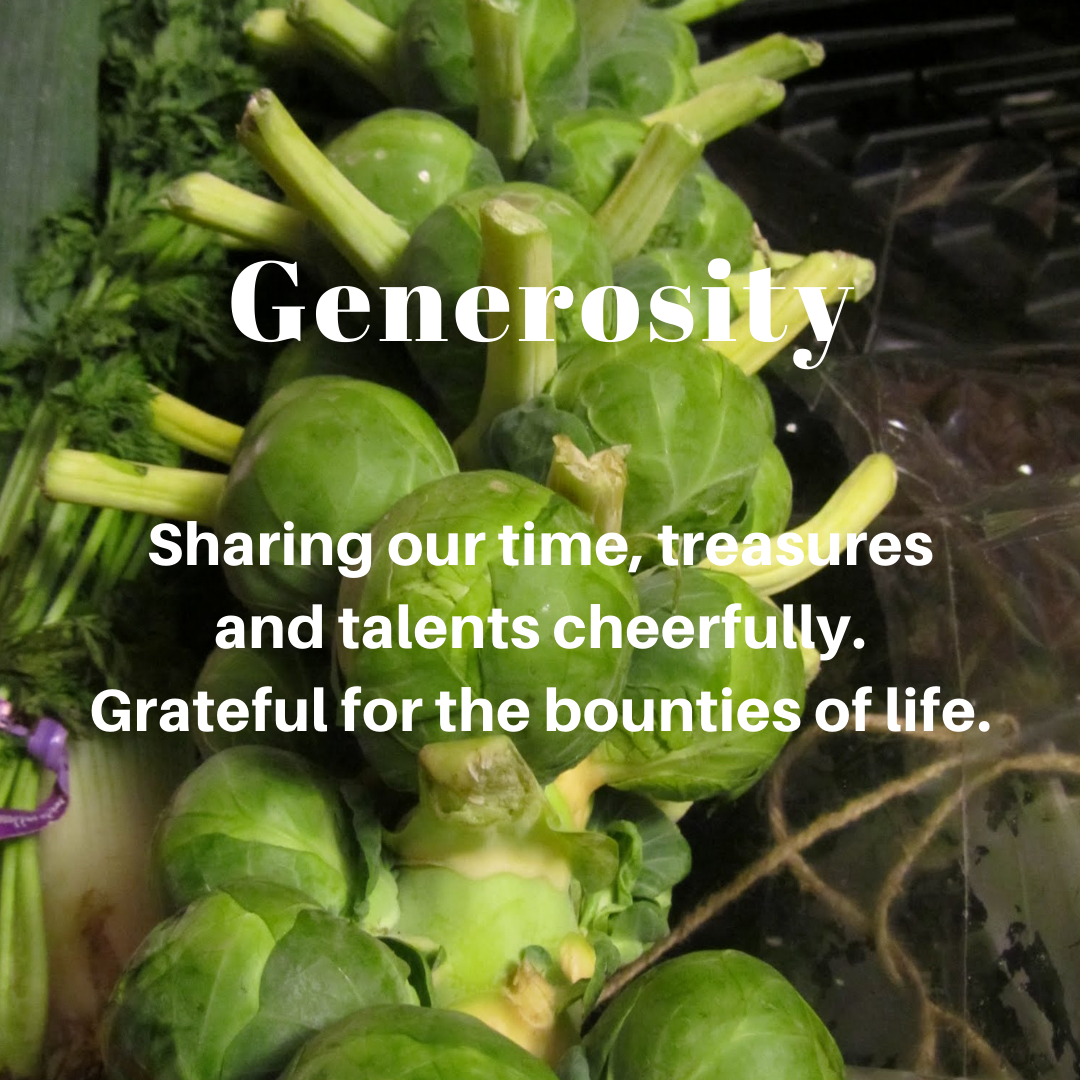
Generosity
Description

Generosity is the heartfelt willingness to give freely and selflessly, whether through material goods, time, attention, or kindness. It is a virtue that reflects an open spirit, a mindset of abundance, and a deep sense of gratitude for what we have. Generosity is not limited to wealth or possessions—it can be as simple as lending a listening ear, offering support, or sharing knowledge.
At its core, generosity allows us to look beyond ourselves and recognize the needs and feelings of others, fostering compassion and empathy. It encourages us to give without expecting anything in return, trusting that the act of giving brings joy and fulfillment to both the giver and the recipient.
True generosity also teaches us to be gracious receivers, accepting the gifts others offer with humility and appreciation. It is about creating a cycle of kindness, where giving and receiving are both acts of love and connection. Whether in friendships, family relationships, workplaces, or communities, generosity enriches life, nurtures bonds, and inspires others to share their gifts as well.
Affirmations for Generosity
1. I give freely and joyfully, without expecting anything in return.
This shifts focus from receiving rewards to experiencing the fulfillment of giving itself.
2. I trust that what I give comes back to me in different, beautiful ways.
This fosters an abundance mindset, encouraging openness to both giving and receiving.
3. I am grateful for what I have and share it generously with others.
Gratitude creates a sense of abundance, making it easier to share with others.
4. I listen to the needs of others with compassion and respond with kindness.
Generosity isn’t just material; offering time and empathy is equally powerful.
5. I share my time and attention with those I love.
This reminds us that our presence is a valuable gift we can offer to others.
6. I allow others the joy of giving to me as well.
Generosity flows both ways; graciously receiving allows other to experience the joy of giving.
7. I believe that small acts of generosity make a big difference.
This encourages consistency in practicing generosity, even in the simplist actions.
8. I seek opportunities to make someone’s day a little brighter.
This affirmation trains the mind to notice and act on moments where kindness can be offered.
9. I give from the heart, knowing that love and kindness are always enough.
Reminds us that generosity stems from love, not from needing to give grand gestures.
10. I am generous with my words, offering encouragement and support to others.
Generosity includes offering uplifing and kind words that nourish the spirit of those around us.
Quotes
“Each of you should give what you have decided in your heart to give, not reluctantly or under compulsion, for God loves a cheerful giver.” — The Bible 2 Corinthians 9:7
“No one has ever become poor by giving.” — Anne Frank, The Diary of a Young Girl
“Generosity is the most natural outward expression of an inner attitude of compassion and loving-kindness.” — The Dalai Lama
Generosity In Family Life
The virtue of generosity in a family is exemplified through selfless acts of kindness, empathy, and a willingness to share without expecting anything in return. It’s the art of wholeheartedly giving material and emotional support, fostering an atmosphere of abundance and compassion within the family unit.
A generous family cultivates an environment where every member feels valued and cared for, strengthening the bonds that tie them together. It is demonstrated through helping one another in need, offering a listening ear without judgment, and openly sharing resources.
Balancing Virtues
When balanced, generosity is a beautiful virtue that enriches our lives and those of others.
-
-
- Self-Care: Self-care reminds us that we must prioritize our well-being to be effective in helping others. It balances the tendency to overextend ourselves.
- Discernment: Discernment encourages us to assess the recipients’ authenticity and our generosity’s impact. It helps us choose where and when to offer assistance, avoiding situations that may exploit our generosity.
- Empathy: Empathy allows us to understand the feelings and needs of others, fostering a natural inclination towards generosity. It helps us connect with the experiences of those around us.
- Compassion: Compassion motivates us to alleviate the suffering of others. It encourages us to extend a helping hand when we encounter someone in need, reminding us of our shared humanity.
- Gratitude: Gratitude reminds us of the kindness we’ve received from others and the abundance in our lives. It cultivates a sense of reciprocity and encourages us to give back to the community that has supported us.
-
Guided by these virtues, we can continue to spread the warmth of generosity without losing ourselves in the process, ultimately making the world a kinder and more compassionate place.
Joe is a husband, father, grandfather, author, speaker, educator, course creator, and parent/family coach.
He helps parents develop unity, find clarity, communicate, and develop consistency in their parenting with the Four C’s of Successful Families. You can find his work on social media.
In addition, the Four C’s newsletter is enjoyed by many as it encourages parents to self-care, build their relationships with their partners, and raise their children.
And he loves to golf!





